| Listing 1 - 10 of 19 | << page >> |
Sort by
|
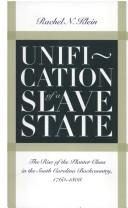
ISBN: 0807839434 146960132X 0807843695 0807818992 9781469601328 9780807818992 9798890886705 Year: 1990 Publisher: Chapel Hill [North Carolina] London [England]
Abstract | Keywords | Export | Availability | Bookmark
 Loading...
Loading...Choose an application
- Reference Manager
- EndNote
- RefWorks (Direct export to RefWorks)
Plantation owners --- Slavery --- History --- South Carolina --- Politics and government --- Abolition of slavery --- Antislavery --- Enslavement --- Mui tsai --- Ownership of slaves --- Servitude --- Slave keeping --- Slave system --- Slaveholding --- Thralldom --- Owners of plantations --- Planters (Persons) --- Crimes against humanity --- Serfdom --- Slaveholders --- Slaves --- Landowners --- Enslaved persons
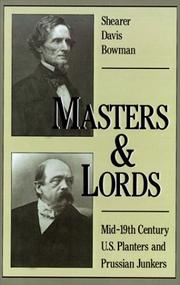
ISBN: 1280440236 142940549X 0195363949 1601296851 9781429405492 9781601296856 9781280440236 9786610440238 6610440239 0195052811 9780195052817 0197714609 Year: 2023 Publisher: New York ; Oxford University Press,
Abstract | Keywords | Export | Availability | Bookmark
 Loading...
Loading...Choose an application
- Reference Manager
- EndNote
- RefWorks (Direct export to RefWorks)
This sweeping study presents a comparative view of large planters in the antebellum American South before the US Civil War and the Junkers of East Prussia during the same period.
Plantation life --- Plantation owners --- Nobility --- Noble class --- Noble families --- Nobles (Social class) --- Peerage --- Upper class --- Aristocracy (Social class) --- Titles of honor and nobility --- Owners of plantations --- Planters (Persons) --- Landowners --- Slaveholders --- History --- Southern States --- Prussia, East (Poland and Russia) --- History.
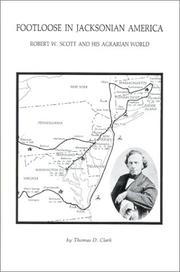
ISBN: 0813159806 9780813159805 0916968197 9780916968199 Year: 1989 Publisher: [Frankfort, KY]
Abstract | Keywords | Export | Availability | Bookmark
 Loading...
Loading...Choose an application
- Reference Manager
- EndNote
- RefWorks (Direct export to RefWorks)
Plantation owners --- Agriculture --- Owners of plantations --- Planters (Persons) --- Landowners --- Slaveholders --- Farming --- Husbandry --- Industrial arts --- Life sciences --- Food supply --- Land use, Rural --- History --- Scott, Robert W. --- Scott, Robert Wilmot, --- United States --- Description and travel. --- Description and travel
Book
ISBN: 9780511994753 9781107011649 9781107605022 9781139159555 1139159550 1107011647 0511994753 9781139161602 1139161601 9781139157797 1139157795 1107605024 1139153048 1107222311 1283341158 9786613341150 1139160605 1139156039 9781139153041 9781107222311 9781283341158 6613341150 9781139160605 9781139156035 Year: 2011 Publisher: Cambridge
Abstract | Keywords | Export | Availability | Bookmark
 Loading...
Loading...Choose an application
- Reference Manager
- EndNote
- RefWorks (Direct export to RefWorks)
Slaveholders were preoccupied with presenting slavery as a benign, paternalistic institution in which the planter took care of his family and slaves were content with their fate. In this book, Eugene D. Genovese and Elizabeth Fox-Genovese discuss how slaveholders perpetuated and rationalized this romanticized version of life on the plantation. Slaveholders' paternalism had little to do with ostensible benevolence, kindness and good cheer. It grew out of the necessity to discipline and morally justify a system of exploitation. At the same time, this book also advocates the examination of masters' relations with white plantation laborers and servants - a largely unstudied subject. Southerners drew on the work of British and European socialists to conclude that all labor, white and black, suffered de facto slavery, and they championed the South's 'Christian slavery' as the most humane and compassionate of social systems, ancient and modern.
Slavery --- Plantation owners --- Paternalism --- Slaves --- Plantation workers --- Whites --- White people --- White persons --- Ethnology --- Caucasian race --- Agricultural laborers --- Enslaved persons --- Persons --- Parentalism --- Social classes --- Social control --- Social systems --- Owners of plantations --- Planters (Persons) --- Landowners --- Slaveholders --- History --- Social conditions --- Arts and Humanities
Book
ISBN: 1108506410 1108515355 1316481182 1107138051 1316502899 Year: 2017 Publisher: Cambridge : Cambridge University Press,
Abstract | Keywords | Export | Availability | Bookmark
 Loading...
Loading...Choose an application
- Reference Manager
- EndNote
- RefWorks (Direct export to RefWorks)
This book examines the home and leisure life of planters in the antebellum American South. Based on a lifetime of research by the late Eugene Genovese (1930-2012), with an introduction and epilogue by Douglas Ambrose, The Sweetness of Life presents a penetrating study of slaveholders and their families in both intimate and domestic settings: at home; attending the theatre; going on vacations to spas and springs; throwing parties; hunting; gambling; drinking and entertaining guests, completing a comprehensive portrait of the slaveholders and the world that they built with slaves. Genovese subtly but powerfully demonstrates how much politics, economics, and religion shaped, informed, and made possible these leisure activities. A fascinating investigation of a little-studied aspect of planter life, The Sweetness of Life broadens our understanding of the world that the slaveholders and their slaves made; a tragic world of both 'sweetness' and slavery.
Slavery --- Plantation owners --- Paternalism --- Slaves --- Plantation workers --- Whites --- White people --- White persons --- Ethnology --- Caucasian race --- Agricultural laborers --- Enslaved persons --- Persons --- Parentalism --- Social classes --- Social control --- Social systems --- Owners of plantations --- Planters (Persons) --- Landowners --- Slaveholders --- History --- Social conditions
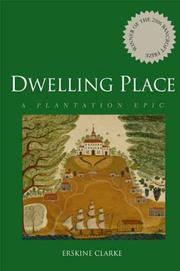
ISBN: 9780300122565 9786611731458 0300133286 9780300133288 9780300108675 0300108672 1281731455 9781281731456 6611731458 Year: 2005 Publisher: New Haven [Conn.] : Yale University Press,
Abstract | Keywords | Export | Availability | Bookmark
 Loading...
Loading...Choose an application
- Reference Manager
- EndNote
- RefWorks (Direct export to RefWorks)
Published some thirty years ago, Robert Manson Myers's Children of Pride: The True Story of Georgia and the Civil War won the National Book Award in history and went on to become a classic reference on America's slaveholding South. That book presented the letters of the prominent Presbyterian minister and plantation patriarch Charles Colcock Jones (1804-1863), whose family owned more than one hundred slaves. While extensive, these letters can provide only one part of the story of the Jones family plantations in coastal Georgia. In this remarkable new book, the religious historian Erskine Clarke completes the story, offering a narrative history of four generations of the plantations' inhabitants, white and black.Encompassing the years 1805 to 1869, Dwelling Place: A Plantation Epic describes the simultaneous but vastly different experiences of slave and slave owner. This "upstairsdownstairs" history reveals in detail how the benevolent impulses of Jones and his family became ideological supports for deep oppression, and how the slave Lizzy Jones and members of her family struggled against that oppression. Through letters, plantation and church records, court documents, slave narratives, archaeological findings, and the memory of the African-American community, Clarke brings to light the long-suppressed history of the slaves of the Jones plantations-a history inseparably bound to that of their white owners.
Plantation life --- Plantation owners --- Whites --- Slaves --- African Americans --- Afro-Americans --- Black Americans --- Colored people (United States) --- Negroes --- Africans --- Ethnology --- Blacks --- Enslaved persons --- Persons --- Slavery --- White people --- White persons --- Caucasian race --- Owners of plantations --- Planters (Persons) --- Landowners --- Slaveholders --- Country life --- History --- Jones, Charles Colcock, --- Jones, Lizzy --- Jones, C. C. --- Family. --- Liberty County (Ga.) --- Liberty Co., Ga. --- Race relations. --- Social life and customs --- Black people
Book

ISBN: 1283872374 1611172306 9781611172300 9781570038945 1570038945 Year: 2010 Publisher: [Columbia, S.C.] University of South Carolina Press
Abstract | Keywords | Export | Availability | Bookmark
 Loading...
Loading...Choose an application
- Reference Manager
- EndNote
- RefWorks (Direct export to RefWorks)
Coclanis that places these letters and the legacy of the Heyward family into a broader historical context.
Plantation life --- Rice --- Aristocracy (Social class) --- Plantation owners --- Rice farmers --- Country life --- Lowland paddy --- Lowland rice --- Oryza sativa --- Paddy (Plant) --- Padi --- Palay --- Oryza --- Aristocracy --- Aristocrats --- Upper class --- Nobility --- Owners of plantations --- Planters (Persons) --- Landowners --- Slaveholders --- Farmers --- Rice workers --- History --- Hayward family --- Heyward, Edward Barnwell, --- South Carolina --- South Carolina (Colony) --- South Carolina (Province) --- I︠U︡zhnai︠a︡ Karolina --- Social life and customs
Book
ISBN: 0817391517 9780817391515 9780817319663 0817319662 Year: 2017 Publisher: Tuscaloosa
Abstract | Keywords | Export | Availability | Bookmark
 Loading...
Loading...Choose an application
- Reference Manager
- EndNote
- RefWorks (Direct export to RefWorks)
Education, Higher --- Sugar growing --- Creoles --- Plantation owners --- Elite (Social sciences) --- Elites (Social sciences) --- Leadership --- Power (Social sciences) --- Social classes --- Social groups --- Owners of plantations --- Planters (Persons) --- Landowners --- Slaveholders --- Racially mixed people --- Sugar --- College students --- Higher education --- Postsecondary education --- Universities and colleges --- History. --- History --- Education --- Jefferson College (Convent, La.)
Book
ISBN: 9781611176476 1611176476 9781611176469 Year: 2016 Publisher: Columbia, South Carolina : Baltimore, Md. : The University of South Carolina Press, Project MUSE,
Abstract | Keywords | Export | Availability | Bookmark
 Loading...
Loading...Choose an application
- Reference Manager
- EndNote
- RefWorks (Direct export to RefWorks)
Plantation owners --- Families --- Owners of plantations --- Planters (Persons) --- Landowners --- Slaveholders --- Family --- Family life --- Family relationships --- Family structure --- Relationships, Family --- Structure, Family --- Social institutions --- Birth order --- Domestic relations --- Home --- Households --- Kinship --- Marriage --- Matriarchy --- Parenthood --- Patriarchy --- Social aspects --- Social conditions --- Cheeves family --- Middleton family --- Flat Rock (Henderson County, N.C.) --- Flat Rock, N.C. --- History
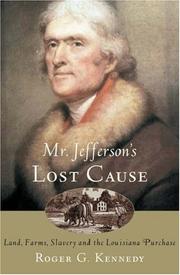
ISBN: 0190288426 1280837756 0198034989 9780198034988 0195153472 9780190288426 9781280837753 Year: 2003 Publisher: New York : Oxford University Press,
Abstract | Keywords | Export | Availability | Bookmark
 Loading...
Loading...Choose an application
- Reference Manager
- EndNote
- RefWorks (Direct export to RefWorks)
Thomas Jefferson advocated a republic of small farmers--free and independent yeomen. And yet as president he presided over a massive expansion of the slaveholding plantation system--particularly with the Louisiana Purchase--squeezing the yeomanry to the fringes and to less desirable farmland. Now Roger Kennedy conducts an eye-opening examination of that gap between Jefferson's stated aspirations and what actually happened. Kennedy reveals how the Louisiana Purchase had a major impact on land use and the growth of slavery. He examines the great financial interests (such as the powerful land com
Louisiana Purchase. --- Slavery --- Plantation owners --- Family farms --- Land settlement --- Resettlement --- Settlement of land --- Colonies --- Land use, Rural --- Human settlements --- Farms --- Farms, Small --- Private plot agriculture --- Owners of plantations --- Planters (Persons) --- Landowners --- Slaveholders --- Extension to the territories. --- Political activity --- History. --- Political aspects --- Jefferson, Thomas, --- Influence. --- United States --- Territorial expansion. --- Politics and government --- Annexations --- Louisiana Purchase --- Jefferson, Thomas --- Views on slavery --- Influence --- Territorial expansion --- Revolution, 1775-1783 --- 1783-1865 --- Extension to the territories --- History
| Listing 1 - 10 of 19 | << page >> |
Sort by
|

 Search
Search Feedback
Feedback About UniCat
About UniCat  Help
Help News
News